

Paris University of Pavia | Ari's Past Student (2020)
7th of April, 2023In this article, you will be provided with the PDFs of the IMAT of 2019, as well as the answer sheet. Later on, after you use it as a simulator, you can continue reading this article and see our analysis, recommendations, and tips for further reading.
The International Medical Admission Test (IMAT) evaluates candidates’ skills across a variety of subject areas, including critical thinking and problem solving. In the 2019 IMAT, both of these sections presented unique challenges for candidates. In this analysis, we will explore the question types and difficulties encountered in the sections of the 2019 IMAT to help future candidates better understand what to expect and how to prepare.
Content Quick Navigation
Section 1: IMAT 2019 Critical Thinking Section Analysis
The 2019 IMAT Critical Thinking section featured a variety of question types that tested candidates’ ability to analyze and evaluate arguments. These questions required candidates to identify argument flaws, assess the strength of text arguments, determine the conclusion of given passages, and uncover underlying assumptions.
Question Types and Frequencies
Critical Thinking Section:
- Argument flaws: Identifying weaknesses or errors in the reasoning presented.
- Weakening text arguments: Determining which statements or arguments undermine a given position.
- Finding conclusions (appeared twice): Identifying the main point or conclusion in a given passage.
- Uncovering assumptions: Recognizing unstated beliefs or premises that underlie an argument.
Problem-Solving Section
- Numerical puzzles (2 questions): These questions involved solving problems using mathematical or logical reasoning.
- Spatial puzzles (3 questions): These questions required candidates to visualize and manipulate shapes or objects in order to solve the problems presented.
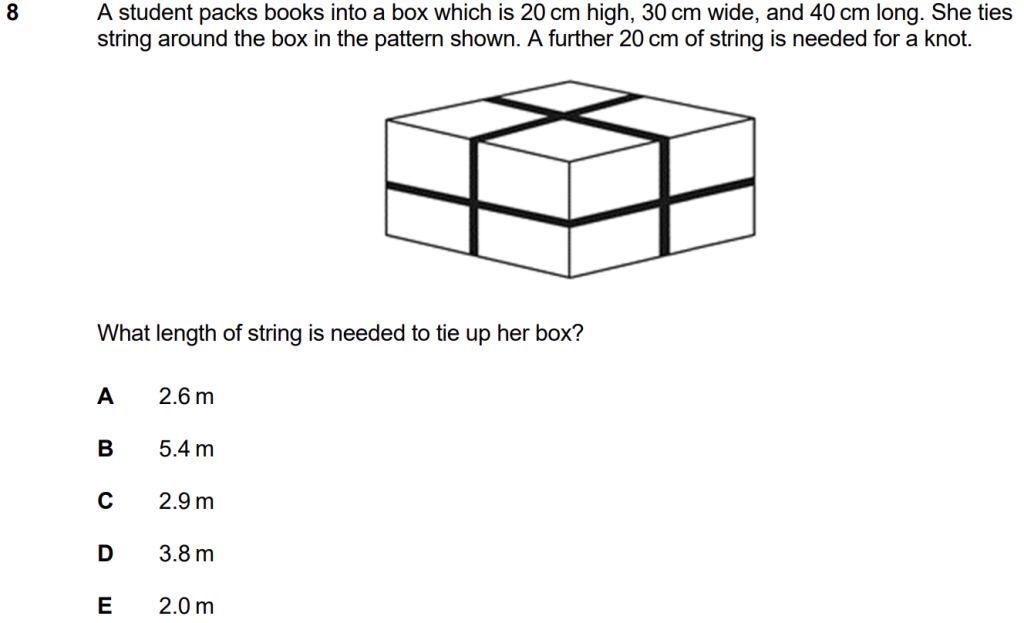

Preparing for the Critical Thinking and Problem-Solving Sections
To effectively prepare for the Critical Thinking and Problem-Solving sections of the IMAT, candidates should consider the following strategies:
- Practice questions and puzzles: Regularly work through practice questions and puzzles related to the question types featured in the 2019 IMAT to improve your analytical and problem-solving skills.
- Develop critical thinking skills: Focus on improving your ability to analyze, synthesize, and evaluate information. These skills are essential for tackling critical thinking questions effectively.
- Improve visualization techniques: For spatial puzzles, practice visualizing shapes and objects in your mind to enhance your spatial reasoning abilities.
- Manage time effectively: As some questions in the problem-solving section can be time-consuming, practice working through problems under timed conditions to develop your speed and efficiency.
- Utilize multiple resources: Employ a combination of textbooks, online resources, and practice exams to ensure a comprehensive understanding of the subject matter and question types.
By examining the question types and difficulties encountered in the 2019 IMAT’s Critical Thinking and Problem-Solving sections, future candidates can better understand what to expect on the exam and how to prepare effectively. By employing the strategies outlined in this analysis, candidates can enhance their critical thinking and problem-solving skills, increasing their chances of success on the IMAT.
General Knowledge
The General Knowledge section of the IMAT encompasses a wide array of topics, ranging from literature and history to science and religion. In the 2019 exam, candidates encountered diverse question types that required them to recall specific information and make connections between various disciplines. In this analysis, we will explore the topics covered in the 2019 General Knowledge section and discuss the inherent unpredictability of this part of the exam.
The 2019 IMAT General Knowledge section featured an assortment of topics that touched upon various aspects of human knowledge. For instance, candidates were tested on their familiarity with literature through questions about authors and their novels, as well as plays and their authors. Additionally, questions about opera and composers assessed candidates’ understanding of the connections between music and history.
The exam also delved into more practical knowledge, such as the purpose of the United Nations and the currencies used in different countries. Candidates were also asked about historical events and their implications, showcasing the importance of understanding the past to better comprehend the present.
Scientific achievements were not left out, as questions about Nobel Prize winners and famous theories in various disciplines were included. Moreover, the exam touched upon religious knowledge, testing candidates’ awareness of the beliefs, practices, and histories of different religious traditions.
The 2019 General Knowledge section also featured questions about literature and its origins, reflecting the significance of understanding the cultural and historical contexts of literary works. Lastly, the section included questions about constitutional states, requiring candidates to be familiar with the fundamental principles underlying different political systems.
Preparing for the General Knowledge Section
Given the wide range of topics and the unpredictability of the questions that may appear in the General Knowledge section, candidates should focus on the following strategies to prepare effectively:
- Broaden your knowledge base: Develop a well-rounded understanding of various subjects, including history, literature, science, and the arts
- Stay up-to-date: Keep informed about current events and global issues, as these may be relevant to questions in the General Knowledge section.
- Engage with diverse resources: Utilize a mix of textbooks, online resources, and cultural experiences to deepen your knowledge and understanding of different topics.
While it is difficult to predict the exact questions that may appear in the General Knowledge section of the IMAT, by familiarizing yourself with a diverse range of subjects and staying informed, you can increase your chances of success in this challenging section of the exam.
Section 2: IMAT 2019 Biology Analysis
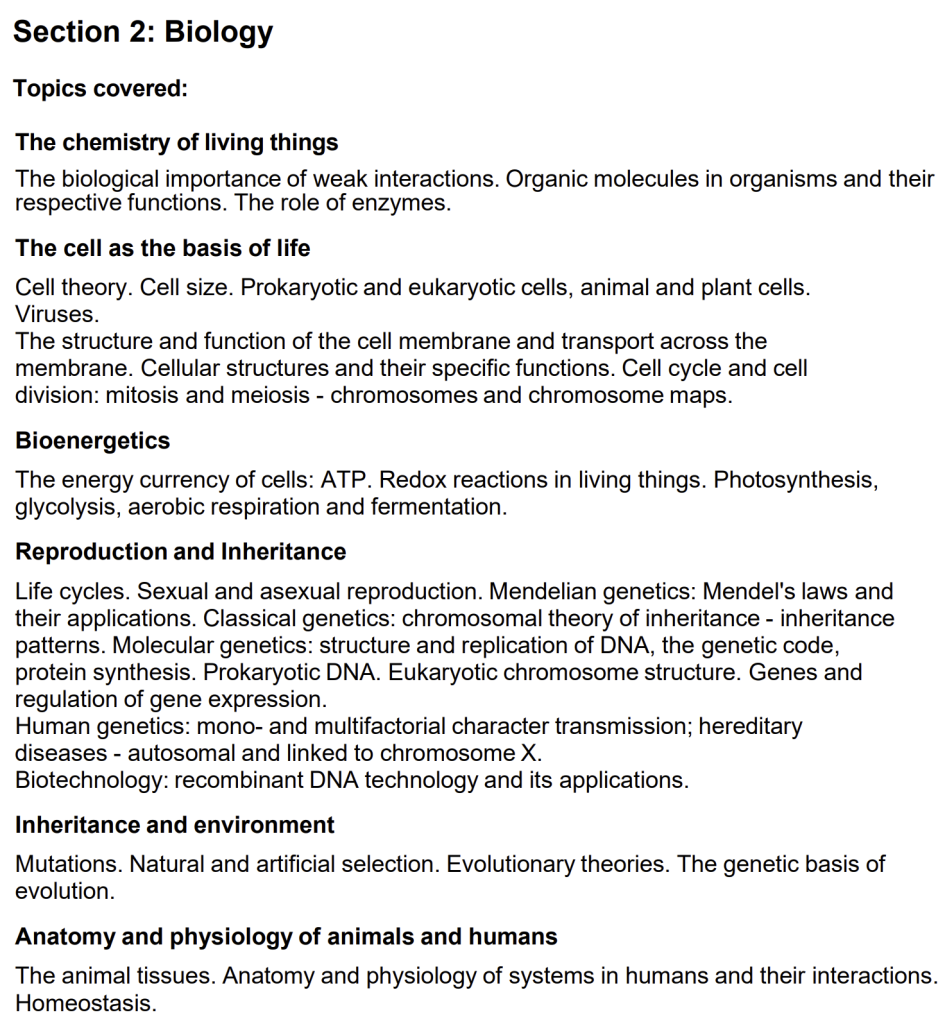

The Biology section of the IMAT tests candidates’ understanding of various biological concepts and principles. In the 2019 exam, a diverse range of topics was covered, spanning from cellular structures to human physiology. In this analysis, we will categorize the main topics featured in the 2019 Biology section and delve into the specifics of each category to help future candidates prepare effectively.
Categories of Biology Concepts
Cellular Biology: This category focuses on the study of cells and their structures, functions, and interactions. Key topics from the 2019 exam included:
- Cell size
- Cellular structures and bonds
- Change in bonds of cells
- Biological molecules
Genetics and Inheritance: This area deals with the principles of heredity, genetic mutations, and the function of chromosomes. Key topics from the 2019 exam included:
- Mendel’s principles of inheritance
- Chromosomes
- Inheritance patterns
- Mutation types
- Genetic modifications
- Mitosis
Physiology: This category examines the functioning of living organisms, including the human body, and covers both animal and plant physiology. Key topics from the 2019 exam included:
- Neuron function
- Muscle physiology
- Kidney physiology
- Blood physiology


Do physiology questions make you anxious? No worries! You can always count on our experienced tutors to be there and answer all your questions and do not forget to check out EnterMedSchool’s 50+ Club to get that unfair advantage when taking the IMAT!
Immunology: This area of study focuses on the immune system and its functions. The 2019 exam included questions on the cells of the immune system.
Tissues and Organ Systems: This category explores the various types of tissues in living organisms and their functions.
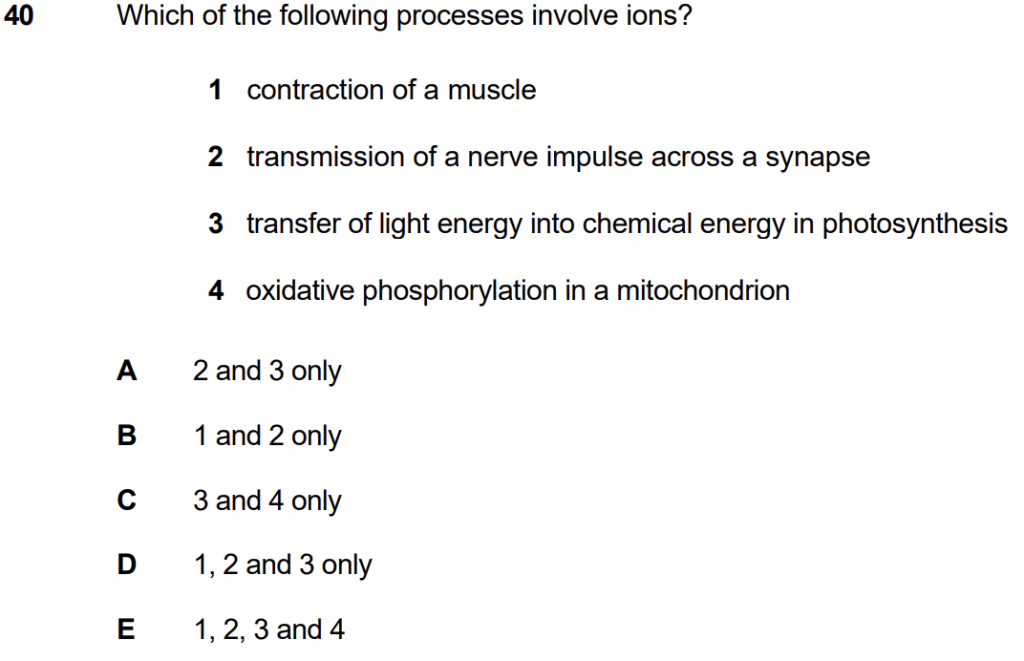

| Topic | Number |
|---|---|
| The chemistry of living things | 5 |
| The cell as a basis of life | 3 |
| Reproduction & Inheritance | 1 |
| Inheritance & Environment | 2 |
| Anatomy & Physiology | 7 |
Conclusion
By examining the main topics and categories featured in the 2019 IMAT Biology section, future candidates can gain a better understanding of the areas they should focus on during their preparation. As each exam may cover different specific topics within these broader categories, it is essential for candidates to have a comprehensive understanding of biology concepts to maximize their chances of success on the IMAT.
Section 3: IMAT 2019 Chemistry Analysis
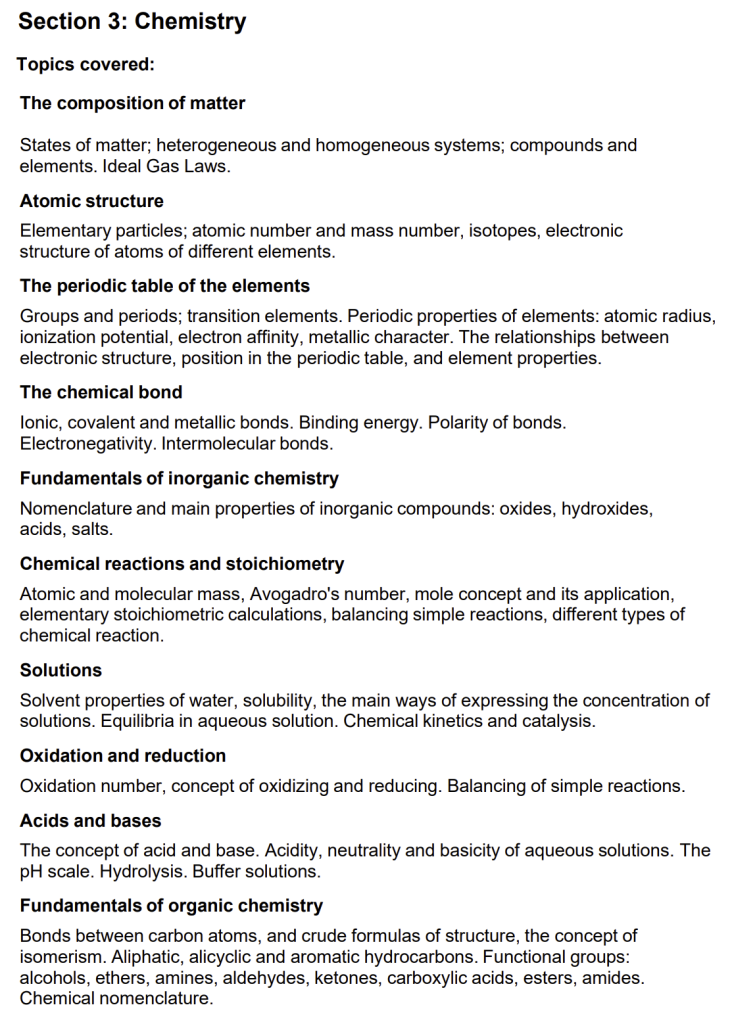

The Chemistry section of the IMAT assesses candidates’ understanding of chemical concepts and principles, ranging from fundamental knowledge to more specific topics. In the 2019 exam, the questions focused primarily on foundational concepts, with some expansion into specific areas, though not in great depth. In this analysis, we will categorize the main topics featured in the 2019 Chemistry section and provide an overview of each category to help future candidates prepare effectively.
Categories of Chemistry Concepts
Fundamental Concepts: This category focuses on the core principles of chemistry, including basic reactions and an understanding of the periodic table. Key topics from the 2019 exam included:
- Redox reactions
- Reactions and equilibrium
- Periodic table properties
- Isotopes
Chemical Structure and Bonding: This area deals with the study of molecular formulas, as well as intra- and intermolecular forces that govern chemical behavior. Key topics from the 2019 exam included:
- Molecular formula interpretation
- Intramolecular forces
- Intermolecular forces
Solutions and Mixtures: This category examines the properties and behavior of solutions, including methods of analysis such as titration. The 2019 exam included:
- Mixtures
- Solutions
- Titration techniques
Organic Chemistry: This area of study focuses on the structure, properties, and reactions of organic compounds. The 2019 exam included questions on organic isomers and their comparison.
table { border-collapse: collapse; width: 60%; } th, td { border: 1px solid black; padding: 8px; text-align: left; } th { background-color: #f2f2f2; }| Topic | Number |
|---|---|
| The composition of matter | 3 |
| The periodic table of the elements | 1 |
| The chemical bond | 2 |
| Chemical reactions and stoichiometry | 2 |
| Solutions | 1 |
| Oxidation and reduction | 1 |
| Acids and bases | 1 |
| Fundamentals of organic chemistry | 1 |
Conclusion
By categorizing the main topics featured in the 2019 IMAT Chemistry section, future candidates can gain a better understanding of the areas they should focus on during their preparation. The emphasis on fundamental concepts in the 2019 exam serves as a reminder to candidates that a strong grasp of core principles is essential for success on the IMAT. Additionally, candidates should be prepared to tackle specific topics within these broader categories, as each exam may cover different aspects of chemistry.
Section 4: IMAT 2019 Mathematics and Physics Analysis
The Math and Physics section of the IMAT tests candidates’ understanding of various mathematical and physical concepts and principles. In the 2019 exam, a diverse range of topics was covered, spanning from kinematics to algebraic equations. In this analysis, we will categorize the main topics featured in the 2019 Math and Physics section and delve into the specifics of each category to help future candidates prepare effectively.
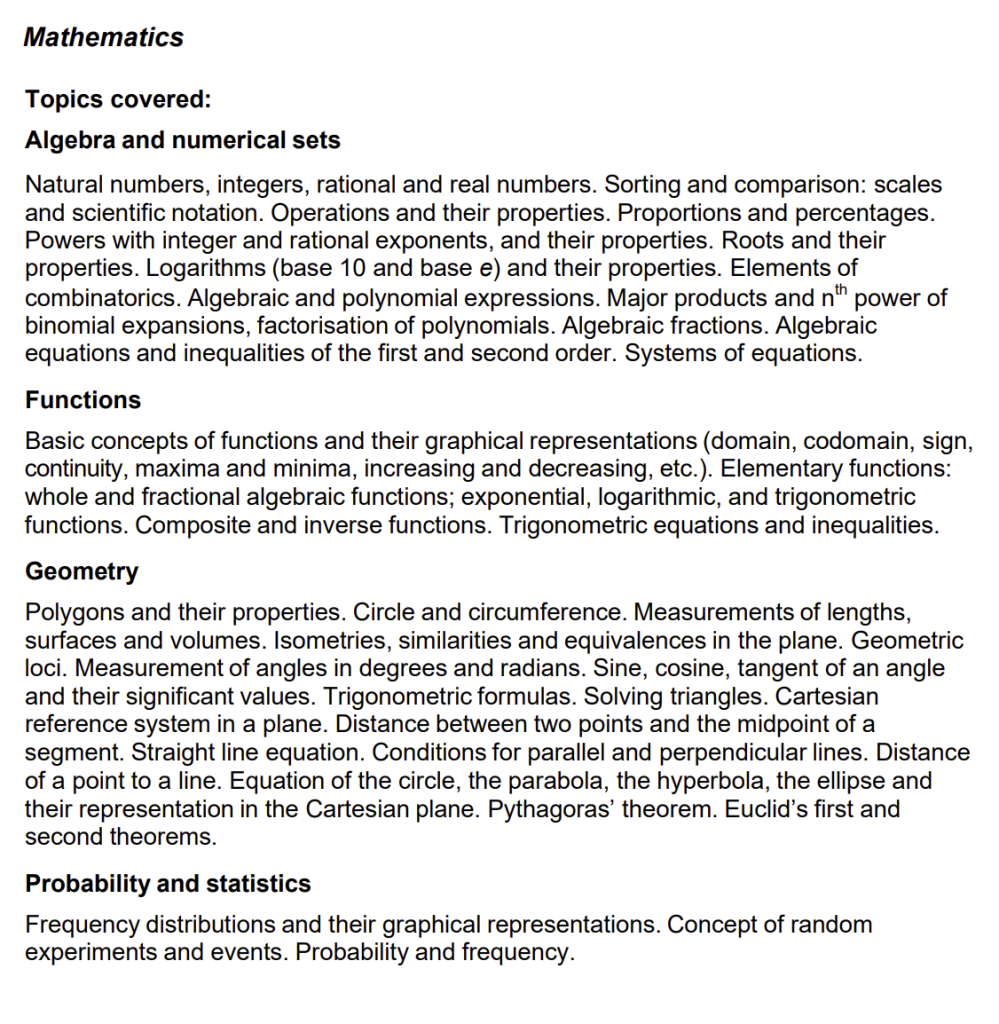

Categories of Math and Physics Concepts
Physics: This category focuses on the study of matter, energy, and their interactions. Key topics from the 2019 exam included:
- Kinematics: The study of motion, including velocity, acceleration, and displacement.
- Liquid mechanics: The analysis of the behavior of liquids in various conditions, such as fluid statics and dynamics.
- Ideal gas law: A fundamental equation in thermodynamics relating pressure, volume, temperature, and the amount of an ideal gas.
- Charged particles: The study of the behavior and interactions of particles carrying an electric charge, such as electrons and protons.
| Topic | Number |
|---|---|
| Kinematics | 1 |
| Fluid Mechanics | 1 |
| Thermodynamics | 1 |
| Electrostatic and electrodynamics | 1 |
Mathematics: This category covers various mathematical concepts, techniques, and problem-solving strategies. Key topics from the 2019 exam included:
- Range of numbers: The difference between the largest and smallest values in a data set or a mathematical function.
- Common factors: Identifying shared factors among different numbers, useful for simplifying expressions and solving problems.
- Algebraic equations: The study of equations involving variables, constants, and algebraic operations, such as addition, subtraction, multiplication, and division.
| Topic | Number |
|---|---|
| Algebra and numerical sets | 4 |
Conclusion
By examining the main topics and categories featured in the 2019 IMAT Math and Physics section, future candidates can gain a better understanding of the areas they should focus on during their preparation. As each exam may cover different specific topics within these broader categories, it is essential for candidates to have a comprehensive understanding of math and physics concepts to maximize their chances of success on the IMAT.

